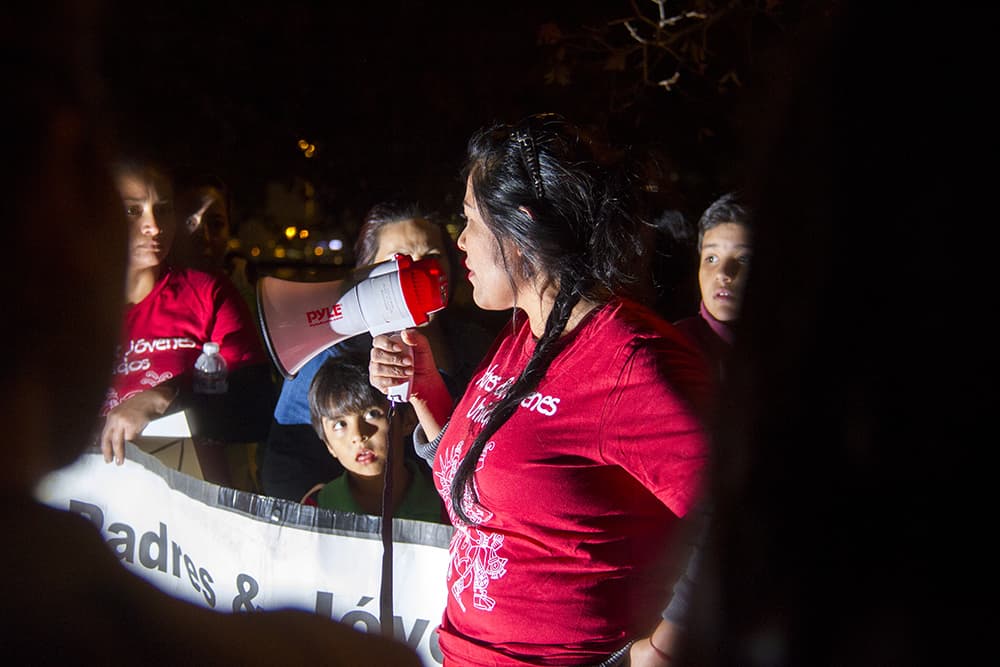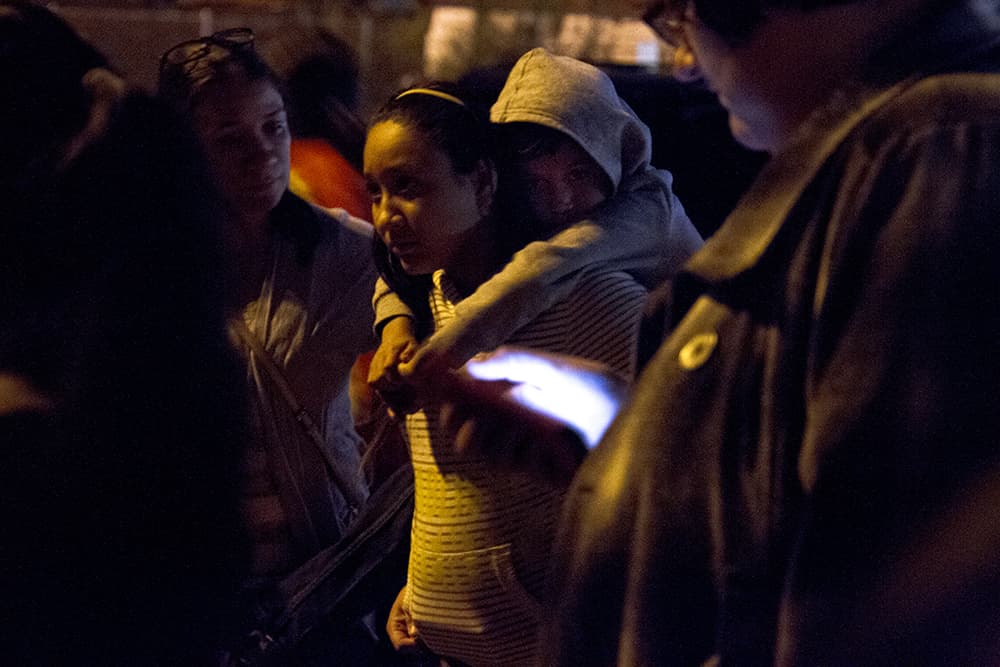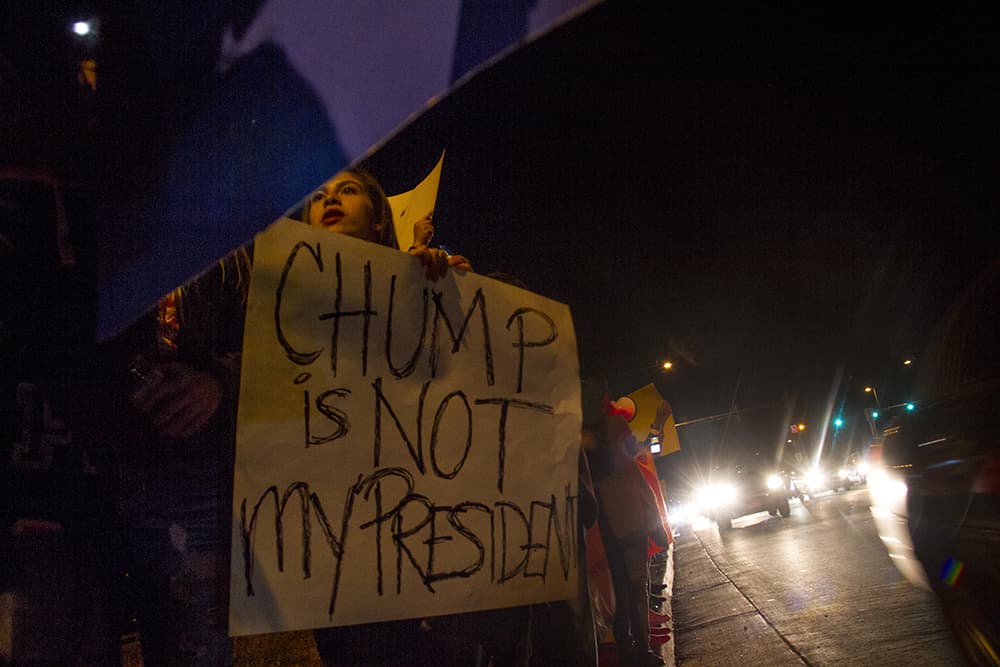
As opponents of President-elect Donald Trump have poured into the streets in cities around the country, some have asked if they are protesting democracy itself. That's not how the protestors see their demonstrations.
"I like to believe that people are good," Angela Gomez told a group of fellow Sheridan High School students Wednesday evening as they protested at 5th Avenue and Federal Boulevard in west Denver. "When it comes down to it, the good outweighs the bad, but I feel like yesterday everything was questioned. Everything I knew was questioned. Are people really as good as I thought? It's a hard thing to deal with.
"But coming here and seeing all of you protesting and fighting for what you believe in makes me feel better."
This election has left some people reeling.
"It's enough to say that I'm at a loss for words," Jordan Henry wrote in an email around 1 a.m. Wednesday. "I'm embarrassed and devastated. That this level of hatred for women and minorities exists is unimaginable to me. I am shocked. I apologize to Secretary Clinton and our friends worldwide. This vote doesn't represent me or the people I associate with."
I had talked to Henry, a second-year law student at the University of Colorado in Boulder, before the election in the event the results called for a story about proud female voters electing the first woman president. That's obviously not the story this election turned out to be.
Before you dismiss Henry as someone who lives in Boulder's infamous "bubble," she grew up in Florida in a Republican family. She was a ballet dancer before an injury led her on a new path. She's been inspired by Clinton's legal career to use the law to help women, and that hasn't changed.
"If anything, this inspires me to focus on what drove me to law school," she said. "This drives me to redouble my efforts to fight for women's rights. This drives me to fight for minorities and children."
But not everyone is shocked.
Community activist Candi CdeBaca said she saw two majors factors in the election. Voters on all sides were motivated mainly by fear, and the white electorate remains larger and more inclined to vote than that of people of color.
"Honestly, I'm worried," CdeBaca said of Trump's victory. "I'm worried to see what plays out. But now everyone can see what I've been seeing. I don't think people realized how racist things really are and how fearful a huge block of our population is. I think it will help us bring to light that this fearful group is shrinking. We need to teach the growing groups to utilize power in a more equitable and compassionate way."
People who don't like the outcome need to get involved in politics and not just during presidential years, she said.
"It's clear that our political system, the way that we're electing people, didn't work, but it highlights for people that we need to get engaged in the local and state level and understand how a state can turn blue or red and how we can take control of that if that's not what we want our state to look like," she said. "Get involved and create an alternative. And that's not going to happen by sitting on the sidelines."
Angela Padilla, 53, of west Denver, is a longtime political activist in Colorado who first got involved in 1998 to fight an effort to make English the official language of the state. As she woke up to a new reality Wednesday, she was disappointed but philosophical.
"I survived Reagan and Bush. I can survive this. And after eight years of Bush, we got Obama and we got health care," she said.
(Whether we keep health care remains to be seen, and Padilla said Democrats need to put pressure on legislators from both parties to not grant Trump a blank check.)
Latino voters in Colorado turned out in large numbers for Clinton, but around the country, there was not the groundswell of support many Democrats had expected from Trump's anti-immigrant rhetoric.
"I have Hispanic relatives who voted for Trump," Padilla said. "They're gun owners, and they're very concerned about Hillary Clinton taking their guns, even though I told them she's not. We're not homogenous. My great-grandparents were born in Colorado in the 1850s. Immigration isn't a top issue for me, and they kept focusing on immigration. But I know for a lot of Latinos, it is a top issue."
Padres y Jovenes Unidos Director Ricardo Martinez said people are afraid because of the rhetoric that Trump deployed on the campaign trail.
"We've been hearing this rhetoric for a year and a half, these mass deportations, building a wall, your parents are rapists," he said. "One candidate was saying that, now president-elect Trump. We see anxiety and fear on people's hearts and minds."

Martinez said he expected it to be close, but he expected Clinton to prevail.
"I think everybody expected a tight race," he said. "I don't think anyone expected that it would go this way. For the last eight years, which for some people here is half their life, they've been hearing about this post-racial society.... We've just elected someone who displays the worst in a human being. A bully, a racist, a bigot. He got the presidency. That should tell our country where we stand on the issue of race."
"It's a catharsis," he said of the demonstration, which drew about 50 people Wednesday evening. Next comes the work of preparing for the next election and the next.
"This is the democratic process," he said. "If we want to get involved, democracy is a participatory sport. You don't just sit back and observe it. If this is what happens, we're going to be coming back to organize for sounder and better policy and that the rhetoric we heard in the campaign doesn't become a reality."

At a larger rally on the steps of the state Capitol Thursday, state Rep. Joe Salazar, a fervent supporter of Vermont Sen. Bernie Sanders in the primary, said Democrats need to push a more progressive agenda at every level to counter the appeal of Trump.
"People at the Capitol are afraid to be too progressive," he said.
Helen Barron, 83, is a self-described "recovering Republican" who was loyal to her party as recently as the 2004 presidential election.
"I was pretty devastated," she said of Clinton's defeat. "From the beginning it was, 'Surely, people will get wise to him, surely people will get wise to him.' He was a master at marketing, he manipulated the media to get all this free publicity and he tapped into something I’m not sure even he realized was there."
She casts the election as a "throw the rascals out" event. Even when I spoke to her before the election, Barron was concerned that Clinton wasn't doing enough to reach those who have seen their economic prospects decline and who feel ignored by elites. She said both parties have "bottomed out" in different ways and need to rebuild.
"I think the country is resilient enough to withstand this," she said. "We’ve gone through … maybe worse. Though I can’t think of anything off the top of my head. The Civil War, I guess."
And she passed the torch to a younger generation.
"People my age only have a certain amount of time we can do something," she said. "It’s going to be the young people who roll up their sleeves and do the work and make the changes. Maybe something better can come of it. I hope."
Kevin J. Beaty contributed reporting to this article, in addition to these fine photos.
Sign up for Denverite's newsletter here.












